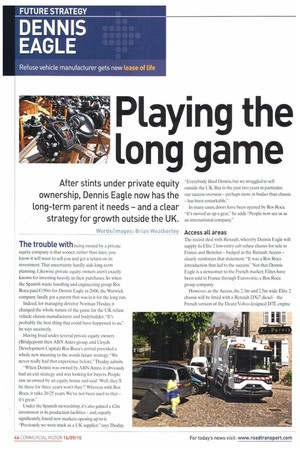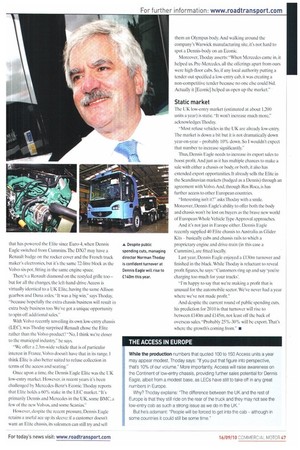Playing the
Page 46

Page 47

If you've noticed an error in this article please click here to report it so we can fix it.
Long. game
After stints under private equity ownership, Dennis Eagle now has the long-term parent it needs and a clear strategy for growth outside the UK.
Words/images: Brian Weathertey Access all areas The trouble with being owned by a private equity company is that sooner, rather than later, you know it will want to sell you and get a return on its investment, That uncertainty hardly aids long-term planning. Likewise, private equity owners aren't exactly known for investing heavily in their purchases. So when the Spanish waste handling and engineering group Ros Roca paid in 50m for Dennis Eagle in 2006, the Warwick company finally got a parent that was in it for the long run.
Indeed, for managing director Norman Thoday, it changed the whole nature of the game for the UK refuse vehicle chassis manufacturer and bodybuilder. "It's probably the best thing that could have happened to us," he says succinctly.
Having lived under several private equity owners (Bridgepoint then ABN Amro group, and Lloyds Development Capital) Ros Roca's arrival provided a whole new meaning to the words future strategy. "We never really had that experience before," Thoday admits.
"When Dennis was owned by ABN Amro, it obviously had an exit strategy and was looking for buyers. People saw us owned by an equity house and said: 'Well, they'll be there for three years won't they?' Whereas with Ros Roca, it talks 20-25 years.We've not been used to that — it's great."
Under the Spanish stewardship, it's also gained a E2m investment in its production facilities — and, equally significantly, found new markets opening up to it. "Previously we were stuck as a UK supplier," says Thoday. "Everybody liked Dennis, but we struggled to sell outside the UK. But in the past two years in particular, our success overseas — perhaps more in bodies than chassis — has been remarkable."
In many cases, doors have been opened by Ros Roca. "It's moved us up a gear," he adds. "People now see us as an international company."
The recent deal with Renault, whereby Dennis Eagle will supply its Elite 2 low-entry cab refuse chassis for sale in France and Benelux — badged as the Renault Access — clearly reinforces that statement. "It was a Ros Roca introduction that led to the success." Not that Dennis Eagle is a newcomer to the French market; Elites have been sold in France through Eurovoirie, a Ros Roca group company.
However, as the Access, the 2.3m and 2.5m wide Elite 2 chassis will be fitted with a Renault DXi7 diesel — the French version of the Deutz/Volvo-designed D7E engine that has powered the Elite since Euro-4, when Dennis Eagle switched from Cummins. The DXi7 may have a Renault badge on the rocker cover and the French truck maker's electronics, but it's the same 72-litre block as the Volvo six-pot, fitting in the same engine space.
There's a Renault diamond on the restyled grille too but for all the changes, the left-hand-drive Access is virtually identical to a UK Elite, having the same Allison gearbox and Dana axles. "It was a big win," says Thoday, "because hopefully the extra chassis business will result in extra body business too. We've got a unique opportunity to spin-off additional sales."
With Volvo recently unveiling its own low-entry chassis (LEC), was Thoday surprised Renault chose the Elite rather than the Volvo product? "No, I think we're closer to the municipal industry." he says.
"We offer a 2.3m-wide vehicle that is of particular interest in France, Volvo doesn't have that in its range. I think Elite is also better suited to refuse collection in terms of the access and seating."
Once upon a time, the Dennis Eagle Elite was the UK low-entry market. However, in recent years it's been challenged by Mercedes-Benz's Econic. Thoday reports that Elite holds a 60% stake in the LE.0 market. "It's primarily Dennis and Mercedes in the UK, some BMC, a few of the new Volvos, and some Scanias."
However, despite the recent pressure, Dennis Eagle retains a useful ace up its sleeve: if a customer doesn't want an Elite chassis, its salesmen can still try and sell them an Olympus body. And walking around the company's Warwick manufacturing site, it's not hard to spot a Dennis-body on an [conic.
Moreover,Thoday asserts: "When Mercedes came in, it helped us. Pre-Mercedes, all the offerings apart from ours were high-floor cabs. So, if any local authority putting a tender out specified a low-entry cab, it was creating a non-competitive tender because no one else could bid. Actually it [Econic] helped us open up the market."
Static market
The t; K low-entry market (estimated at about 1200 units a year) is static. "It won't increase much more," acknowledges Thoday.
"Most refuse vehicles in the UK are already low-entry. The market is down a bit but it is not dramatically down year-on-year probably 10% down. So wouldn't expect that number to increase significantly."
Thus, Dennis Eagle needs to increase its export sales to boost profit. And just as it has multiple chances to make a sale with either a chassis or body, or both, it also has extended export opportunities. It already sells the Elite in the Scandinavian markets (badged as a Dennis) through an agreement with Volvo. And, through Ros Roca, is has further access to other European countries.
-Interesting isn't it?" asks Thoday with a smile. MoreoVer, Dennis Eagle's ability to offer both the body and chassis won't be lost on buyers as the brave new world of European Whole Vehicle Type Approval approaches.
And it's not just in Europe either. Dennis Eagle recently supplied 40 Elite chassis to Australia as Glider Kits basically cabs and chassis rails to which a proprietary engine and drive-train (in this case a Cummins), are fitted locally.
Last year, Dennis Eagle enjoyed a £130m turnover and finished in the black. While Thoday is reluctant to reveal profit figures, he says: "Customers ring up and say 'you're charging too much for your trucks'.
"I'm happy to say that we're making a profit that is unusual for the automobile sector. We've never had a year where we've not made profit."
And despite the current round of public spending cuts, his prediction for 2010 is that turnover will rise to between £140m and £145m, not least off the back of overseas sales "Probably 25%-30% will be export.That's where the growth's coming from." II




























































































































